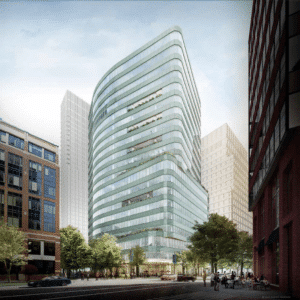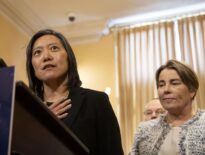
Biogen’s is consolidating its Cambridge lab space at 75 Broadway in Kendall Square/Image courtesy of Elkus Manfredi Architects
The lab space vacancy rate hit 25 percent across Greater Boston during the first quarter, as companies continued to downsize and list new sublease space.
Just one life science company signed a lease in the city of Boston during the quarter, a 10,000 square-foot deal by Nanite at the Innovation and Design Building on Drydock Avenue.
Across the region, negative absorption totaled 640,000 square feet. Companies completed 927,000 square feet of leases, mainly reflecting Biogen’s commitment to 580,000 square feet at the Volpe Center redevelopment in Kendall Square, according to CBRE’s first-quarter life science report.
The prospect of trade wars and federal cuts to National Institutes of Health funding add new risk factors to an industry that’s been retrenching since 2022 amid a more challenging financing market.
“Even before implementation, tariffs have already impacted public pharmaceutical and biotech companies. A number of large pharmaceutical companies experienced scale-backs in market capitalization once the new administration announced the potential for these tariffs,” CBRE researchers wrote. “A pullback in NIH funding could potentially cause clinical trials to pause, as well as reduce research institutes’ need for lab space across the region.”
The industry had been broadly expanding in Boston and the suburbs through 2022, flush with investment from venture capital industry. Since then, companies have gravitated back to the industry hub of East Cambridge, which attracted 62 percent of the urban market’s leases in 2023 and 2024.
But even East Cambridge now has a double-digit vacancy rate at 11.7 percent, with 118,000 square feet of negative absorption in the first quarter.
Two of the largest lease deals signed in Cambridge represent consolidation: Biogen’s transaction will leave behind 735,000 square feet it occupies in other buildings in Cambridge. Intellia Therapeutics leased 146,000 square feet at 400 Technology Square, but is consolidating up to four other Cambridge locations.
Boston’s 16.3 million square-foot lab market also had 124,000 square feet of negative absorption, as sublease availabilities hit 4.9 percent of the total market.
The availability rate hit 35 percent citywide, with the highest availability of 38 percent in the 5.8-million square-foot Seaport District submarket. Rents also are on a downward trajectory, declining 1.4 percent to $94.13 per square foot in Boston on a triple-net basis.
Layoffs and sublease activity contributed to sluggishness in suburban markets, which had nearly 400,000 square feet of negative absorption as availabilities rose 2.1 percent to 36.2 percent. Companies now are listing 1.2 million square feet of sublease space, representing 6 percent of the suburban market.
Barring a major turnaround in tenant demand, vacancies are poised to rise further as new developments near completion. New construction in Greater Boston totals a nation-leading 4.7 million square feet, Colliers reported, topping 3.5 million square feet in the San Francisco Bay area.








